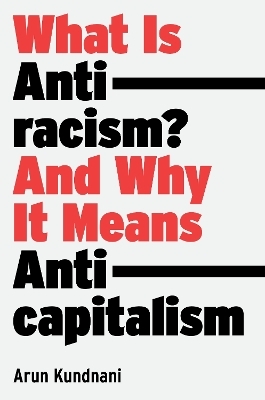
What Is Antiracism?
And Why It Means Anticapitalism
Seiten
2023
Verso Books (Verlag)
978-1-83976-276-5 (ISBN)
Verso Books (Verlag)
978-1-83976-276-5 (ISBN)
This scintillating intellectual and political history provides a new understanding of racism, and a better way to fight it
Liberals have been arguing for nearly a century that racism is fundamentally an individual problem of extremist beliefs. Responding to Nazism, thinkers like gay rights pioneer Magnus Hirschfeld and anthropologist Ruth Benedict called for teaching people, especially poor people, to be less prejudiced. Here lies the origin of today's liberal antiracism, from diversity training to Hollywood activism. Meanwhile, a more radical antiracism flowered in the Third World. Anticolonial revolutionaries traced racism to the broad economic and political structures of modernity. Thinkers like C.L.R. James, Claudia Jones, and Frantz Fanon showed how racism was connected to colonialism and capitalism, a perspective adopted even by Martin Luther King.
Today, liberal antiracism has proven powerless against structural oppression. As Arun Kundnani demonstrates, white liberals can heroically confront their own whiteness all they want, yet these structures remain.
This deeply researched and swift-moving narrative history tells the story of the two antiracisms and their fates. As neoliberalism reordered the world in the last decades of the twentieth century, the case became clear: fighting racism means striking at its capitalist roots.
Liberals have been arguing for nearly a century that racism is fundamentally an individual problem of extremist beliefs. Responding to Nazism, thinkers like gay rights pioneer Magnus Hirschfeld and anthropologist Ruth Benedict called for teaching people, especially poor people, to be less prejudiced. Here lies the origin of today's liberal antiracism, from diversity training to Hollywood activism. Meanwhile, a more radical antiracism flowered in the Third World. Anticolonial revolutionaries traced racism to the broad economic and political structures of modernity. Thinkers like C.L.R. James, Claudia Jones, and Frantz Fanon showed how racism was connected to colonialism and capitalism, a perspective adopted even by Martin Luther King.
Today, liberal antiracism has proven powerless against structural oppression. As Arun Kundnani demonstrates, white liberals can heroically confront their own whiteness all they want, yet these structures remain.
This deeply researched and swift-moving narrative history tells the story of the two antiracisms and their fates. As neoliberalism reordered the world in the last decades of the twentieth century, the case became clear: fighting racism means striking at its capitalist roots.
Arun Kundnani has been active in antiracist movements in Britain and the United States for three decades. He is a former editor of the journal Race & Class and was a scholar-in-residence at the Schomburg Center for Research in Black Culture at the New York Public Library. The Guardian has described him as "one of Britain's best political writers." He lives in central New York state.
| Erscheinungsdatum | 30.05.2023 |
|---|---|
| Verlagsort | London |
| Sprache | englisch |
| Maße | 140 x 210 mm |
| Gewicht | 382 g |
| Themenwelt | Literatur ► Biografien / Erfahrungsberichte |
| Literatur ► Essays / Feuilleton | |
| Geisteswissenschaften ► Religion / Theologie | |
| Sozialwissenschaften ► Ethnologie | |
| Sozialwissenschaften ► Soziologie | |
| ISBN-10 | 1-83976-276-4 / 1839762764 |
| ISBN-13 | 978-1-83976-276-5 / 9781839762765 |
| Zustand | Neuware |
| Informationen gemäß Produktsicherheitsverordnung (GPSR) | |
| Haben Sie eine Frage zum Produkt? |
Mehr entdecken
aus dem Bereich
aus dem Bereich
Caspar David Friedrichs Reise durch die Zeiten
Buch | Hardcover (2023)
S. Fischer (Verlag)
25,00 €


